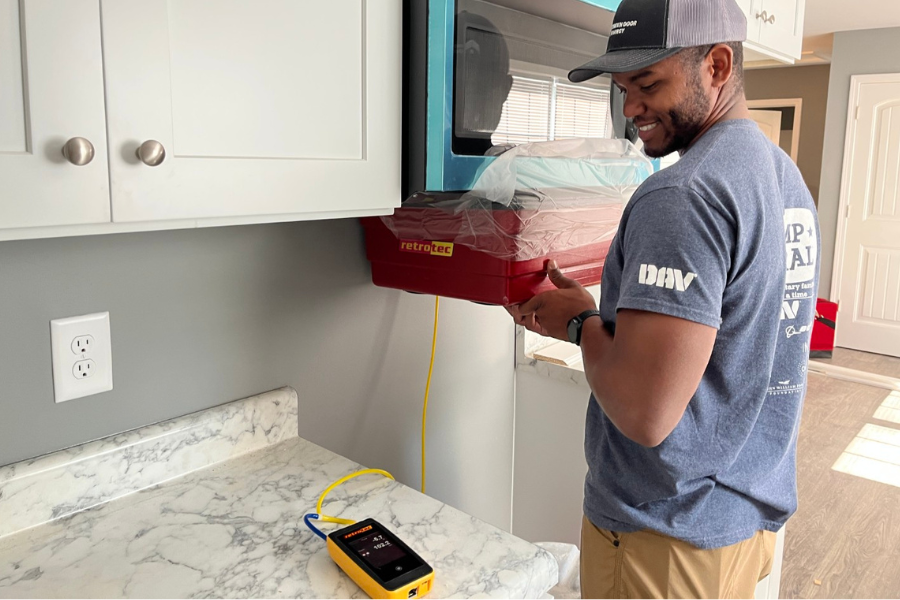Dec 10, 2024
Philadelphia Home Upgrade Job Training Shows How to Invest in Local Workers
For cities to reach their climate targets, they must dramatically reduce emissions from residential buildings. One Philadelphia workforce program offers an innovative approach to help overcome a challenge many cities face: the need for more qualified workers for needed energy upgrades.
By: Roxana Ayala

Across the country, cities have adopted ambitious climate goals, committing to clean energy and more efficient technologies, homes, and transportation networks. Many of these goals can only be achieved with a skilled workforce ready to turn these investments into action. That will require working with local organizations to address workforce needs.
Only two cities in ACEEE’s 2024 City Clean Energy Scorecard earned credit for partnering with a local institution, union, or community-based organization on workforce initiatives that helped individuals from disadvantaged communities and the broader community obtain and keep in-demand clean energy jobs. Building robust partnerships enables cities to involve organizations early in program development, which can help inform and streamline the program’s design and set it up for success.
With billions of dollars in federal funding coming to states and localities for energy efficiency and clean energy projects, a Philadelphia program demonstrates an innovative approach to equitably meeting workforce needs to complete residential upgrades. A new case study ACEEE released today profiles the program and can inspire other cities to equitably build and scale their workforce to perform energy upgrades in owner-occupied housing.
A focus on equity while connecting Philadelphians to the growing demand for energy jobs
In 2016, the Philadelphia Energy Authority (PEA) launched the Philadelphia Energy Campaign, a bold investment to scale up clean energy and energy efficiency projects. One of the campaign’s goals is to create 10,000 jobs, and PEA launched the Green Retrofit Immersive Training (GRIT) program in 2021 to help make progress toward this goal. The GRIT program prepares participants to fill jobs while diversifying the workforce. The case study details the 18-week program’s curriculum and focuses; here, we describe how the program advances equitable outcomes for Philadelphians who participate.
Removing barriers to participation and building local partnerships sets up workforce programs for success
The GRIT program provides lessons that can help other local governments successfully and equitably grow their workforce through efforts like removing barriers to participation and developing partnerships that help build capacity among local organizations.
Proactively removing barriers to participation improves equitable access
Too often, groups experiencing marginalization and disinvestment, like communities of color and low-income communities, are excluded from job opportunities stemming from the clean energy transition because of barriers to participation and employment. For instance, lack of access to childcare or reliable transportation can prevent an individual from committing to a training program or internship.
To equitably target, recruit, and train people from all city segments, PEA integrates wrap-around services into its curriculum. These services are resources that can promote professional development, improve an individual’s socioeconomic challenges, and overcome employment barriers. To provide these services, PEA contracted two local nonprofit organizations that provide job readiness support (such as how to write a resume or prepare for interviews) and long-term counseling and career planning. Incorporating these services ensures that programs are more accessible to members of disinvested communities and supports success when they participate in training or navigate employment.
Developing partnerships builds capacity for a successful program
PEA found that proactively developing relationships with local organizations, like training centers, community-based organizations, and employers, helped optimize the program’s benefits. For example, regular networking sessions have allowed PEA to engage with local employers in the clean energy sector and update the program’s training curriculum to include the skills required by local employers, thus funneling participants into job opportunities.
Prioritizing partnerships can support long-term job placement for program participants and enrich their professional development. Employers, especially those experiencing workforce shortages, also stand to gain from these partnerships. By influencing the training curriculum, employers can shape a workforce that can more quickly respond to their needs and avoid project delays.

Equitable workforce initiatives can ensure successful clean energy investments
Since 2021, 57 trainees have graduated from the program, and more are currently enrolled. Participants have pursued a range of careers as retrofit installer technicians, energy inspectors, entrepreneurs, welders, HVAC technicians, and industry-related salespersons. The GRIT program is an effective model that cities can learn from to grow a robust and equitable workforce.
A shortage of professionals can be a significant barrier to completing projects that are needed to reach a city’s climate goals. Therefore, we recommend that cities incorporate workforce training programs like GRIT in Philadelphia to bring clean energy jobs to communities that need them the most.
This article was originally published in the ACEEE blog and is republished with permission.






